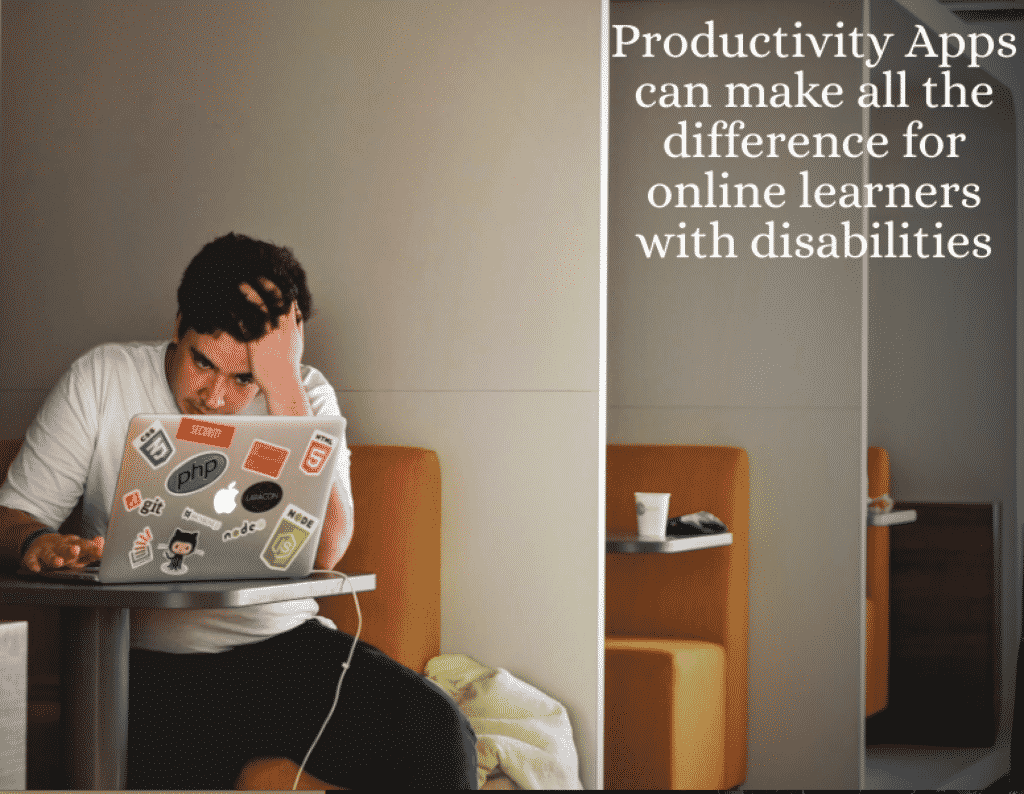College students with disabilities have been getting much more attention recently as a population who has historically been misunderstood, stigmatised, and therefore underserved. As awareness has shifted around learning disabilities and necessary accommodations, it has become more and more clear that there have always been a lot of students on campuses all over the country with disabilities, which include a myriad of undiagnosed learning disabilities. Even Ivy League schools have Disability Resource Centers, because students with disabilities are enrolled at colleges of every caliber. With the proper tools having a disability can be seen as a setback in a learning environment. The National Center on Learning Disabilities is one of several organizations that are conducting up-to-date research on the topic of learning disabilities in higher education. They have determined that at least 1 in 5 college students have a diagnosed learning disability. Online Education for disabled students is often an excellent fit.
Higher education has taken giant steps in recent years, as so many programmatic opportunities have been made available online. This may not come as a surprise to you, but now you can achieve entire degrees without ever stepping foot into a classroom. While in some ways online learning is a dream come true for many students who have a disability, it also has its own set of complications. There are different obstacles to consider when studying online as a student with a learning disability. It is still so new to have as much as we do available in cyber classroom settings. As a result, there is quite a bit that still needs to be ironed out. Learning online gives students a lot more flexibility and in some cases allows for basic freedoms like being in an environment that fits their bodies comfortably, or allows them the space to take breaks when they need to.
As you know, all schools are not created equal. Some of the best online college programs are designed while taking students with disabilities into account, while others did not even consider that some students will require accommodations to participate fully. Universal Design for Learning (UDL) is a framework that looks at learning environments and uses research to make them more flexible and accessible to all learners. There is also what is called Web Content Accessibility Guidelines (WCAG) which ensures that the online coursework is compliant in meeting accessibility standards everyone involved.
There are many things to keep in mind when studying online with a learning disability. It is good to think through everything if this journey belongs to you. Below you will find ten facts specific to studying online with a learning disability.
1. Yes, Even Online Schools have Disability Resource Centers
Every online institution of higher learning is different, but one thing you can usually count on is that there will be a disability resource center available. Sometimes you might have to dig around to find this asset, unfortunately, but it is worth it. It might even look like a virtual collection of resources that aim to serve a similar purpose for students who study online. This is often the go-to place for students to communicate about their disability status and understand what accommodations are available to support their learning. This might also be where you can go to access services such as note taking assistance, alternative media to support coursework, and might even include access to a mentor to touch base with for academic and emotional support.
2. Online Tutoring Services are Available: Use Them!
Not every online institution has this offering, but if you think it is something that might benefit you, look out for online tutoring opportunities. If you love the school, and they do not offer online tutoring, there are online tutoring services that you can seek out beyond the institution where you study. Tutoring, however, is often a great way to stay on track, and be held accountable to your studies when you are working with a learning disability. Many schools offer zoom tutoring sessions through their disability resource center that can support your unique learning style and needs. A tutor can also support you to find resources that you did not even know existed to support your educational needs.
3. Organization and Productivity Tools

Organization is paramount for success in any academic endeavor, but this is especially true when it comes to online learning for disabled students. There are a myriad of apps available for those who need support to stay on track, from keeping a more nuanced calendar to innovative note taking technology. Tools such as these can be a make-or-break for college students with ADHD and dyslexia, among other learning disabilities. Productivity apps are becoming more and more streamlined, and many of these are especially great for students with learning disabilities, because they can be shared across platforms and with other users. For example, if you are looking to take comprehensive notes, you might want to try evernote, and if you want support tracking time, you might want to consider trying the app toggl. There are many apps available for keeping and watching time, which is often an asset for students who struggle with autism.
4. Utilize Assistive Technologies (AT)
Assistive Technologies (AT) are offerings designed for the success of students with disabilities and are also available for online learners.
Online course accommodations for students with disabilities are often the most crucial component to a successful academic career for students with any disability. The Disability Resource Center is a great place to start to learn what the institution has to offer in this regard. There are many apps that are free and can assist with learning and documentation. Assistive Technology can include any software, equipment/ technology that gives students the opportunity to have an education tailored to their needs.
This can include:
- Speech-to-text technology, which enables students to dictate an assignment, notes, or even an entire academic paper, and have it translated into a document.
- Recording software, which can allow for students to record and save lectures and group discussions to return back and review the course delivery.
- Electronic Worksheets are helpful tools for students with dyslexia and other disabilities. They are helpful for completing and working through assignments that pose challenges.
- Phonetic Spelling Software is also useful for students with dyslexia who are disempowered by spelling challenges
- Talking Calculators
5. Knowing your Rights is Critical

It can sometimes feel so isolating to have a learning disability in higher education, especially when you are not in a campus setting. It is important to remember that people in your shoes have fought to make your experience easier. In the past 50 years more laws have come forth to protect your rights to access a quality education. The ADA (Americans with Disabilities Act), which became a law in 1970, is constantly evolving to provide more protections for people with disabilities in the United States. One aspect of the law is that institutions of higher learning are required to provide “reasonable accommodations” for students with disabilities. This is quite general, but some protections that this law covers include:
- Audio recording of classes, lessons, and lectures
- Necessary physical modifications that include ramps, rails, and curbs
- Learning assistance including electronic transcriptions, readers, and assistive technologies
- Flexibility for the completion of non-essential courses
- Testing modifications
If you are being discriminated against, even in an online learning environment, you have rights. If going through your institution to remediate the discrepancies does not work, finding the Office of Civil Rights (OCR) and filing a complaint is an excellent next step. There are many resources that can support an appeals process.
6. Communication is Crucial
One of the drawbacks of an online education is that you often have to work harder to build relationships with faculty, because you may never share in person space with peers or course facilitators. It is often easier for instructors to miss the cues of students who are needing support around a disability that can be “invisible.” If you don’t, however, communicate with your instructor about your disability, you will be less likely to receive the accommodations that you need for the class to be accessible to you. It is a good idea to make contact with your instructor prior to the start of the class and begin a relationship where you are collaborating to find the tools that will allow you to be successful and present.
7. Pick a School with a Learning Management System That is Right for You
Unfortunately (or fortunately?) there is not one universal online learning platform or design standard. I have taught at three different universities and all of them used entirely different learning platforms, some more user friendly than others. I believe this aspect of online education is taken for granted and not heavily considered when applying to schools. However, most of your work, online discussions, and access to course materials will happen from this learning platform. Even your lectures will be found here, as well as office hours and student engagement. You want to ensure that what the institution has to offer works with your style of learning. Make the research about online learning platforms part of your journey to find the right school. The US News and World Report highlights the importance of finding an effective learning platform in this article. When studying online, many quizzes and tests will be administered through your learning platform as well. Because one of the most common learning accommodations is lengthened test taking times, these standards will be modified through the learning platform itself.
8. Support Services can make on Online Education Possible
When applying to schools it is a good idea to look into any available support services when deciding if the school is right for you. This can include academic advising, and how accessible this is to online students. If the online program offers academic advising, it does not hurt for students to contact an advisor before beginning classes to get started on the right foot as far as calling in support goes. Another good question to ask is if connection with other students is part of the program, or will you be working in isolation? This is good to know in advance to both tailor your expectations and to ensure you are applying to online programs that fit your needs. Does the online learning environment offer a Career Center? Is there an online bookstore and/ or library that can be a regular resource for you? Ask these questions and more. Being an informed prospective student can make all the difference.
9. Be Transparent: Disclose your Disability
There is so much stigma about having a learning disability, and as a result, many students wait until acceptance to disclose their disability, if they do at all. This often comes from a fear that they will not get in if they have a learning disability. The truth is, sometimes disclosure shows the determination to succeed, self awareness, and self determination- which are all appealing traits in a prospective student. Also, disability status can be a form of diversity, and colleges today are working harder than ever to diversify their programs and campuses alike. While it may be scary to do-so, chances are that disclosure can positively impact your application outcome and also prepare your campus for your needs.
10. Disclosure Process: Be in the Know
In order to disclose a disability, students must contact the hub for disability services, which is often called a Disability Resource Center. You will find a point person that will verify your disability, and provide you with a list of accommodations. The resource center will collaborate with you in terms of informing your faculty members of your unique requirements. This center’s sole purpose is accommodating students with disabilities in online courses and also in person. Find out the exact protocol and make a plan prior to enrollment.
